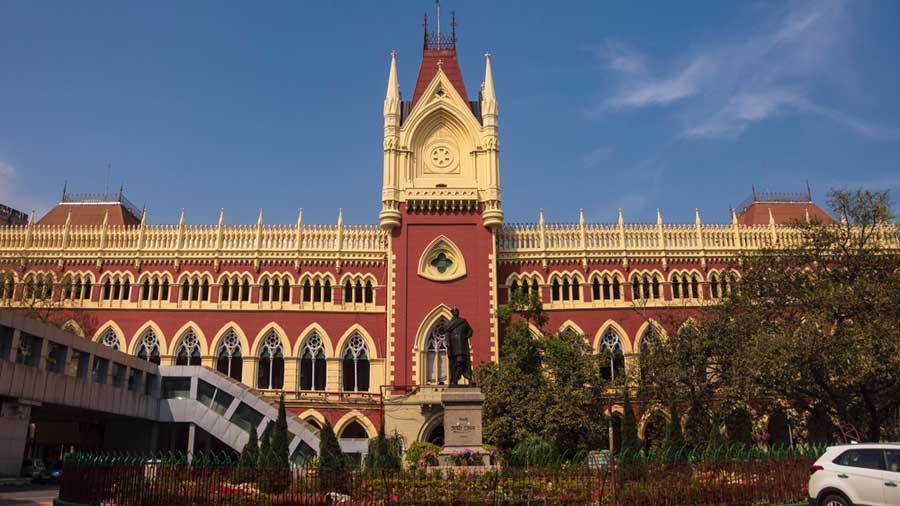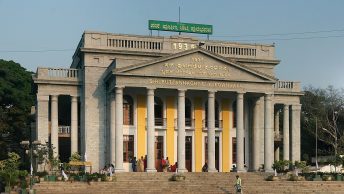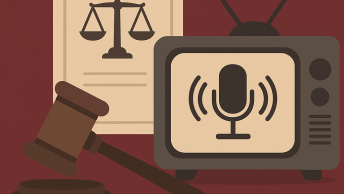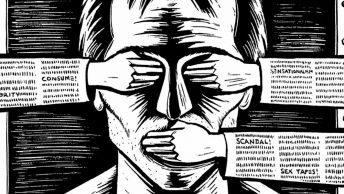The article challenges the Calcutta High Court’s refusal to restrain media trials in Sandipan Ghosh v. Union of India. It argues that such trials can undermine the presumption of innocence, warranting restrictions on media freedom under Article 19(1)(a) to protect the right to life and dignity under Article 21.
Introduction
On August 21, 2024, a single judge bench of the Calcutta High Court in Sandip Ghosh v. Union of India refused to issue an order restraining intermediaries and media houses from conducting a media trial against the erstwhile principal of RG Kar Medical College. Upon a general perusal, the order stands out on three counts: First, the Court noted that the former principal was not an accused, and since the CBI was only interrogating him, concerns about media influence on the courts were premature. Second, the Court held that broad claims about potential harm to the former principal’s reputation did not justify restricting the media’s Article 19(1)(a) right to free speech and expression. Third, the Court stated that if the petitioners were aggrieved by the opinion of any individual being broadcast by any of the media houses, they were at liberty to file a defamation suit. Alternatively, respondents suggested pursuing remedies under the Press Council Act, 1978 (“PCA”) or the Information Technology (Intermediary Guidelines and Digital Media Ethics) Rules, 2021 (“IT Rules”).
Thus, while disposing off the petition, the Court held that an indiscriminate order of restraint on the media or intermediaries was uncalled for. In this article, challenging the Court’s reasoning on all three counts, I submit that the petitioner’s claim, in fact, was not premature. I argue that media trials of such nature can potentially destroy the presumption of innocence, thereby providing sound grounds to curtail broadcast media under Article 19(1)(a). Thereby, I advocate for a view where the right to a fair trial trumps the right to free speech.
Premature Claim
Shampa Sarkar J., noted:
“First and foremost, the petitioner is not an accused. The CBI has been calling the petitioner for interrogation. Thus, the allegation of trial by media and the courts being influenced by any such news coverage is premature.”
The problem with this interpretation is that while the CBI interrogations are still ongoing, the media’s coverage of these investigations has the potential to create a perception of guilt among the public even before charges are formally filed. Thus, while the Court’s decision in the present case may be technically correct on procedural grounds, Article 21 mandates that the procedure should be ‘reasonable,’ which does not seem to be the case at present. For the courts must have considered whether a procedure that permits irreparable injury—before legal protections can be invoked—can truly be deemed reasonable.
Restricting Article 19(1)(a)
Shampa Sarkar J., while emphasizing on the importance of safeguarding freedom of speech, noted:
“Such omnibus allegations that the news coverage would harm the petitioner No.1 and cause irreparable injury to his reputation and prejudice future proceedings, will not justify curtailment of the right guaranteed under Article 19(1)(a) of the Constitution of India which guarantees freedom of speech and expression to all, including the right to broadcast.”
To its credit, the intention behind upholding free speech is commendable. However, the Court failed to recognize that these ‘omnibus allegations‘ intended to prevent ‘irreparable injury‘ involve a pattern of coverage rather than events that occur in isolation. As a result, the cumulative effect of this continuous scrutiny leads to the creation of a prejudicial environment, infringing upon the petitioner’s right to a fair and just trial. This understanding aligns with the verdict in Manu Sharma v. State (NCT of Delhi), wherein the Court acknowledged the impact that a media trial can have on the right of an accused to a fair trial. The Court held that media trials could potentially destroy the presumption of innocence, which would be “opposed to the very basic rule of law and would impinge upon the protection granted to an accused under Article 21.” Therefore, when viewed from this standpoint, a lack of specificity in allegations makes little to no sense.
Further, to draw an interesting parallel, the Supreme Court in Re: Noise Pollution held that under Article 21, every person has the right to live in a noise-free atmosphere which cannot be overridden by the exercise of the right under Article 19(1)(a) of the Constitution. Similarly, I submit that continuous media scrutiny and public backlash can be equated to a form of ‘informational pollution’. Just as noise pollution violates the right to a peaceful environment, excessive and prejudicial media coverage violates the right to a dignified life and a fair trial. Both scenarios create an atmosphere that infringes upon fundamental rights protected under Article 21. Therefore, in cases of media trials, the right to a fair trial and dignified life should be weighed heavily against the freedom of press, potentially justifying restraints on media coverage to safeguard the foundational tenets of Article 21.
Liberty to File Defamation Suit
Before disposing of the writ petition, Shampa Sarkar J. concluded:
“If the petitioners are aggrieved by the opinion of any individual that is broadcast by any of the media houses, i.e., be it print or electronic, the petitioners have the remedy to file a defamation suit. Thus, an indiscriminate order of restraint on the media or the intermediaries at this stage, on the pleadings before this Court, is uncalled for.”
For starters, the very fact that the court asks to file a suit after defamation has occurred defeats the foundational intent of the law, which is to protect individuals from being defamed. Furthermore, it’s important to understand that defamation primarily addresses reputational harm, which can indeed be compensated later through monetary damages. However, the issue at hand extends beyond mere reputational damage. Media trials can potentially influence the course of justice, prejudice potential jurors or witnesses, and undermine the presumption of innocence – harms that cannot be adequately remedied through post-facto compensation. Thus, the immediate and potentially irreversible nature of these harms necessitates preventive action rather than remedial measures.
Moreover, the process of pursuing a defamation suit can be lengthy and costly, during which time the damage to the individual’s reputation and right to a fair trial continues unabated. By the time a defamation case concludes, the harm done to the legal process may be irreversible. Therefore, in the present case, the granting of injunctions should have been a plausible and wise way forward. As in such cases, ‘harm’ continues to escalate with each passing day, making injunctions critical, given that they offer immediate relief and help prevent further damage.
For civil proceedings in India, the standard for granting an interim injunction is well established. The Supreme Court, in Gujarat Bottling Co. Ltd. v. Coca Cola Co., enunciated a three-fold test for the same: (i) A prima facie case in favor of the plaintiff; (ii) Whether the balance of convenience tilts in favor of the plaintiff and against the defendant(s); and (iii) If the interim injunction sought is not granted, the plaintiff will suffer irreparable harm.
In this context, the first essential is quite clearly and conveniently met, given the widespread coverage and scrutiny over the matter, and the spread of conspiracy theories. The second essential, which concerns the balance of favor, is of paramount importance, particularly since the petitioner is under interrogation by the CBI. Public perception and media pressure in such cases can be intense. Lastly, the third essential relates to future harm, which is also evident given how the media painting the petitioner guilty affects the petitioner’s reputation and the right to live life with dignity.
Addressing the Question of Alternative Remedies
“Learned Deputy Solicitor General appears on behalf of the respondent nos. 1 and 2 and submits that the Information Technology (Intermediary Guidelines and Digital Media Ethics Code) Rules, 2021 provide adequate remedy. The petitioners can approach the concerned authority… With regard to the allegations against the respondent nos.5 to 8 and 10, adequate remedy 4 has been provided under the Press Council Act, 1978. The petitioners are always at liberty to approach the Council with their grievance.”
The alternative remedies suggested by the respondents, namely those under Rules 3 and 3A of the IT Rules, and the PCA, are inadequate to address the immediate and potentially irreversible harm caused by media trials. The former, while providing a grievance redressal mechanism, is time-consuming and may not offer immediate relief. As by the time a complaint is redressed—typically within 15 days—significant reputational damage may have already occurred. Furthermore, the IT Rules primarily address digital content, potentially leaving traditional broadcast media unchecked. Similarly, the powers of the Press Council of India under PCA are limited to issuing warnings or censures to erring publications, lacking the authority to award damages or halt ongoing coverage, as discussed at length in Haribhoomi Communications Pvt. Ltd. v. Press Council of India.
Hence, it is my submission that only a gag order can effectively protect the rights of the petitioner under media scrutiny due to three key advantages: its immediate effect in stopping potentially harmful coverage, its comprehensive coverage across all forms of media (print, broadcast, and digital), and its preventive nature in halting potential harm before it occurs rather than attempting to mitigate damage after the harm has been done.
Conclusion
In essence, while challenging the three counts, all arguments have ultimately stemmed from the fact that they are either violative of the right to life or a fair trial as guaranteed under Article 21. To this end, I submit that irreparable harm must be prevented so as to further Article 21’s goal of ensuring the same. As argued, the petitioner in the present case must be regarded as being on par with an accused, given the circumstances involved and the nature of the proceedings. Consequently, the right to life enshrined under Article 21 must trump the right to free speech under Article 19.
As importantly noted in Sahara v. SEBI, the presumption of innocence is embedded in Part III of the Constitution “not only as part of the rule of law under Article 14 but also as an Article 21 right.” Therefore, in the present case, upholding Article 21 lays sound grounds to restrict freedom of speech under Article 19(1)(a) through a balancing exercise to protect the presumption of innocence and prevent the dangers posed by a media trial. For it must be understood that while freedom of speech and expression is undoubtedly one of the most important rights guaranteed by the Constitution, the media must not enjoy any right(s) superior to those of an individual citizen.
Rajyavardhan Singh is a 2nd-year student at Rajiv Gandhi National University of Law.
Ed Note: This article has been edited by Aditi Bhojnagarwala and published by Abhishek Sanjay from the Student Editorial Board.







[…] Posted byRajyavardhan Singh […]
oja4fb
Spor Habeleri,Güncel Haberler, Sondakika Haberleri
Atasehir bölgesinde ev arayisiniz var ise, sizlere atasehirsatilik.com sitesini kesinlikle öneririm. Satilik Daire, Dükkan, Arsa ve Ofis imkanlari ile Atasehir bölgesinde profesyonel emlak hizmeti saglamaktadir.
Atasehir bölgesinde ev arayisiniz var ise, sizlere atasehirsatilik.com sitesini kesinlikle öneririm. Satilik Daire, Dükkan, Arsa ve Ofis imkanlari ile Atasehir bölgesinde profesyonel emlak hizmeti saglamaktadir.